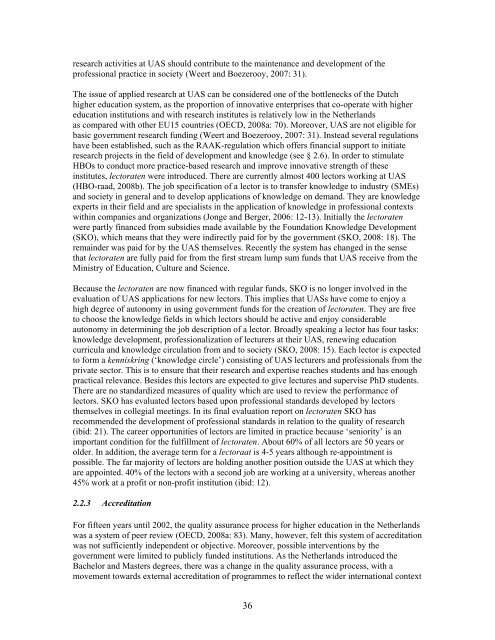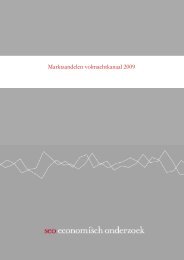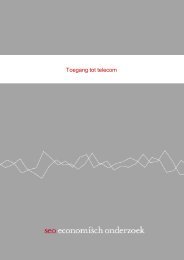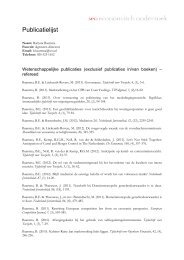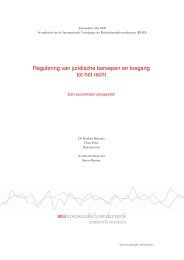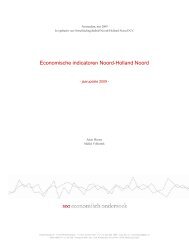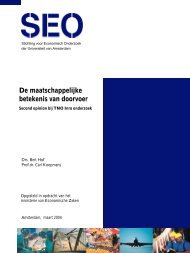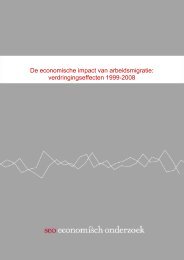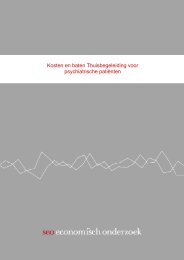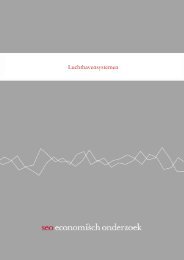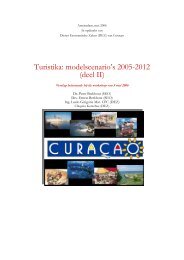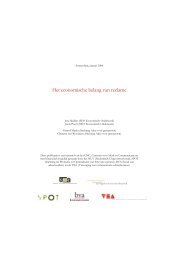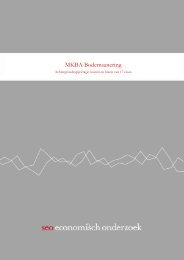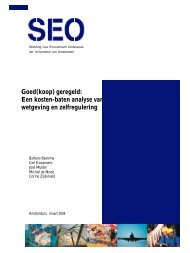esearch activities at UAS should contribute to the maintenance and development of theprofessional practice in society (Weert and Boezerooy, 2007: 31).The issue of applied research at UAS can be considered one of the bottlenecks of the Dutchhigher education system, as the proportion of innovative enterprises that co-operate with highereducation institutions and with research institutes is relatively low in the <strong>Netherlands</strong>as compared with other EU15 countries (OECD, 2008a: 70). Moreover, UAS are not eligible forbasic government research funding (Weert and Boezerooy, 2007: 31). Instead several regulationshave been established, such as the RAAK-regulation which offers financial support to initiateresearch projects in the field of development and knowledge (see § 2.6). In order to stimulateHBOs to conduct more practice-based research and improve innovative strength of theseinstitutes, lectoraten were introduced. There are currently almost 400 lectors working at UAS(HBO-raad, 2008b). The job specification of a lector is to transfer knowledge to industry (SMEs)and society in general and to develop applications of knowledge on demand. They are knowledgeexperts in their field and are specialists in the application of knowledge in professional contextswithin companies and organizations (Jonge and Berger, 2006: 12-13). Initially the lectoratenwere partly financed from subsidies made available by the Foundation Knowledge Development(SKO), which means that they were indirectly paid for by the government (SKO, 2008: 18). Theremainder was paid for by the UAS themselves. Recently the system has changed in the sensethat lectoraten are fully paid for from the first stream lump sum funds that UAS receive from theMinistry of Education, Culture and Science.Because the lectoraten are now financed with regular funds, SKO is no longer involved in theevaluation of UAS applications for new lectors. This implies that UASs have come to enjoy ahigh degree of autonomy in using government funds for the creation of lectoraten. They are freeto choose the knowledge fields in which lectors should be active and enjoy considerableautonomy in determining the job description of a lector. Broadly speaking a lector has four tasks:knowledge development, professionalization of lecturers at their UAS, renewing educationcurricula and knowledge circulation from and to society (SKO, 2008: 15). Each lector is expectedto form a kenniskring (‘knowledge circle’) consisting of UAS lecturers and professionals from theprivate sector. This is to ensure that their research and expertise reaches students and has enoughpractical relevance. Besides this lectors are expected to give lectures and supervise PhD students.There are no standardized measures of quality which are used to review the performance oflectors. SKO has evaluated lectors based upon professional standards developed by lectorsthemselves in collegial meetings. In its final evaluation report on lectoraten SKO hasrecommended the development of professional standards in relation to the quality of research(ibid: 21). The career opportunities of lectors are limited in practice because ‘seniority’ is animportant condition for the fulfillment of lectoraten. About 60% of all lectors are 50 years orolder. In addition, the average term for a lectoraat is 4-5 years although re-appointment ispossible. The far majority of lectors are holding another position outside the UAS at which theyare appointed. 40% of the lectors with a second job are working at a university, whereas another45% work at a profit or non-profit institution (ibid: 12).2.2.3 AccreditationFor fifteen years until 2002, the quality assurance process for higher education in the <strong>Netherlands</strong>was a system of peer review (OECD, 2008a: 83). Many, however, felt this system of accreditationwas not sufficiently independent or objective. Moreover, possible interventions by thegovernment were limited to publicly funded institutions. As the <strong>Netherlands</strong> introduced theBachelor and Masters degrees, there was a change in the quality assurance process, with amovement towards external accreditation of programmes to reflect the wider international context36
(ibid: 83). In part, this new system of national accreditation was implemented in response to the1999 Bologna declaration which identified certain expectations of higher education in Europe,including quality assurances processes.The <strong>Netherlands</strong>-Flanders Accreditation Organization (NVAO) was established by law as theaccrediting body, with responsibility for the accreditation of all Bachelors and Mastersprogrammes from publicly funded institutions, and private institutions wishing to offer degreeprogrammes (ibid: 83). This implies that private higher education institutions will be included inthe accreditation procedures on an equal footing with public ones, apart from the issue of publicfunding (Weert and Boezeroy, 2007: 71). This will open up the Dutch higher education systemfor globalization forces. The NVAO evaluates each Bachelors and Masters programme foraccreditations on a 6-year cycle (MinOCW, 2007a: 76). The criteria used to evaluate theseprogrammes are aims and objectives, content of the programme, deployment of staff, facilitiesand provisions (OECD, 2008a: 84).The Ministry of Education, Culture and Science has set the ambition to make the accreditation ofhigher education programmes at HBO institutions and universities simpler and more efficient. Inorder to achieve this, OCW wants to broaden and virtually halve the number of Bachelorprogrammes at universities. University Master degree programmes and UAS courses will also berestructured and reduced in number. New programmes of study will not be accredited until theMinistry of Education, Culture and Science has first established that there is a social demand forthem (MinOCW, 2007a: 121). In the short term, the Ministry of Education, Culture and Scienceaims to reduce the administrative burden by obliging the NVAO to focus more on the educationalcontent of study programmes and less on the process involved.2.2.4 Overall size of the higher education systemThe total number of students in higher education rose from just over 438,000 in 1997-98 toaround 585,000 in 2007-08 (Figure 2-2). This is an increase of more than 33% over a 10-yearperiod. However, this growth was biased in favor of UAS. For a large part, this can be explainedby an increasing gap in graduates from secondary educational schools between the HAVO level(which mainly prepares for studies at a UAS) and VWO (which predominantly prepares forstudies at a research university) (Statistics <strong>Netherlands</strong> Statline, 2009a). The inflow of newstudents to UAS shows a strong growth over the period 1997-98 to 1999-00, followed by a threeyearperiod of decline and subsequently growth from 2002-03 onwards. The inflow of students toresearch universities shows a steady growth over the entire period from 1997-98 to 2007-08. Inrelative terms, the inflow of students to UAS increased by 27% over the past ten years, whereasthe inflow of students to research universities increased by almost 50%. It therefore seems thatresearch universities are catching up with UAS in terms of total student enrolment over the nextcouple of years.However, in accepting new students universities are also increasingly confronted with a financialconstraint since the public educational budget for universities has remained more or less stableover the past decade whereas student numbers have increased strongly. This implies that theeducational budget per student has decreased over the last ten years (Figure 2-8). As Table 2-1shows, the growth of the student population at UAS has been positive for more than a decade. Bycomparison, the number of students enrolled at universities was in decline over the period 1993-98 (Table 2-2). In recent years the number of university students is on the rise again, albeit thatthe gap between enrolments at UAS and universities is also widening. In the academic year 2007-08, the UAS sector had some 384,000 students whereas some 219,000 students were enrolled atthe 14 Dutch research institutions.37
- Page 1 and 2: Please cite this paper as:SEO Econo
- Page 6 and 7: 2.3 Higher education and the labor
- Page 8 and 9: 6.3 Mechanisms to promote regional
- Page 10 and 11: Table 4-4: Completion rates of diff
- Page 12 and 13: LSCA Life Sciences Center Amsterdam
- Page 14 and 15: such as regional authorities and th
- Page 17 and 18: 1. OVERVIEW OF THE REGION1.1 Introd
- Page 19 and 20: the southEastern part of Amsterdam
- Page 21 and 22: elatively bad accessibility of the
- Page 23 and 24: metropolitan area exceeded that of
- Page 25: egion suffer from one of the follow
- Page 28 and 29: Figure 1-7: Dropouts secondary educ
- Page 30 and 31: Figure 1-9: Employment in Amsterdam
- Page 32 and 33: high-tech sectors is relatively hig
- Page 34 and 35: 1.4.4 Labor market indicatorsTable
- Page 36 and 37: The central government is responsib
- Page 38 and 39: implemented. There is also an admin
- Page 41 and 42: 2 CHARACTERISTICS OF THE HIGHER EDU
- Page 43: Source: MinOCW (2007a: 68), EU (199
- Page 47 and 48: Table 2-1: Student enrolment at UAS
- Page 49 and 50: Figure 2-5: Students at universitie
- Page 51 and 52: Figure 2-6: Participation in tertia
- Page 53 and 54: also show a continued high demand f
- Page 55 and 56: not receive funding from the govern
- Page 57 and 58: of diplomas awarded and the number
- Page 59: decision is up to the HEI itself. I
- Page 62 and 63: Figure 3-1: Components of an innova
- Page 64 and 65: 3.2.3 National funding frameworkThe
- Page 66 and 67: challenge for the years to come wil
- Page 68 and 69: Figure 3-3: R&D expenditures in Noo
- Page 70 and 71: Amsterdam Topstad programme.Creativ
- Page 72 and 73: 3.5.3 Life SciencesGiven the high l
- Page 74 and 75: Figure 3-4: Employment in Amsterdam
- Page 76 and 77: years. Employment in the trade and
- Page 78 and 79: employment has no upward or downwar
- Page 80 and 81: and more efficient exploitation of
- Page 82 and 83: mostly happens in the context of R&
- Page 84 and 85: income related to IP rights. The fa
- Page 86 and 87: Figure 3-6: Regional innovation sys
- Page 88 and 89: HEIs to play this role, as it draws
- Page 91 and 92: 4 CONTRIBUTION OF TEACHING & LEARNI
- Page 93 and 94: housing market, on the ‘buying ma
- Page 95 and 96:
transport, finance, financial manag
- Page 97 and 98:
HvA participates in several initiat
- Page 99 and 100:
4.4 Student recruitment and regiona
- Page 101 and 102:
4.4.1.2 Recruitment of foreign stud
- Page 103 and 104:
• HvA has made its educational pr
- Page 105 and 106:
The HEIs have several external and
- Page 107 and 108:
Table 4-4: Completion rates of diff
- Page 109 and 110:
4.7 Enhancing the regional learning
- Page 111 and 112:
4.8 ConclusionTable 4-6: SWOTStreng
- Page 113:
Amsterdam is matched by a relative
- Page 116 and 117:
The challenge for future social pol
- Page 118 and 119:
The VU likewise develops research p
- Page 120 and 121:
directing, documentary directing, s
- Page 122 and 123:
the university to improve its energ
- Page 125 and 126:
6.1 Introduction6 CAPACITY BUILDING
- Page 127 and 128:
Figure 6-1: Organization chart Vrij
- Page 129 and 130:
There are also examples of more spe
- Page 131 and 132:
Box 6-2: Obstacles for collaboratio
- Page 133 and 134:
eyond labor market studies, there a
- Page 135 and 136:
7 CONCLUSIONS: MOVING BEYOND THE SE
- Page 137 and 138:
…requires different forms of coop
- Page 139 and 140:
at higher levels in order to mainta
- Page 141 and 142:
to increase the interaction between
- Page 143 and 144:
mobility in the world is slackening
- Page 145 and 146:
ecause they are better informed abo
- Page 147 and 148:
REFERENCESAalders, R., A. Bakkeren,
- Page 149 and 150:
EZ Amsterdam (2006), “Research Bu
- Page 151 and 152:
MinOCW (2007a), “The Education Sy
- Page 153 and 154:
SER (2008), “Duurzame Globaliseri
- Page 155:
Versleijen, A., van der Meulen, B.,
- Page 158 and 159:
Institution City Type ofHEIANNEX B:
- Page 160 and 161:
Groningenculture)Hogeschool Amsterd
- Page 163 and 164:
ANNEX C: KEY ECONOMIC INDICATORSTab
- Page 165 and 166:
ANNEX E: REGIONAL PARTNERSHIPS OF A
- Page 167 and 168:
AmsterdamUniversity CollegeOther re
- Page 169 and 170:
ANNEX F: BUSINESSES REPRESENTED IN
- Page 171 and 172:
GLOSSARYBologna DeclarationForeign


